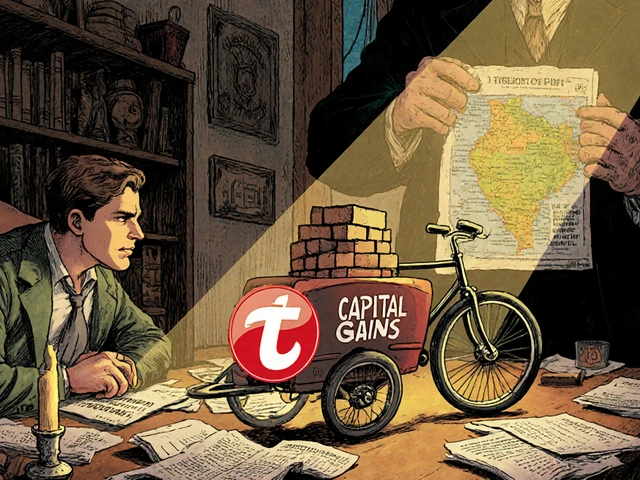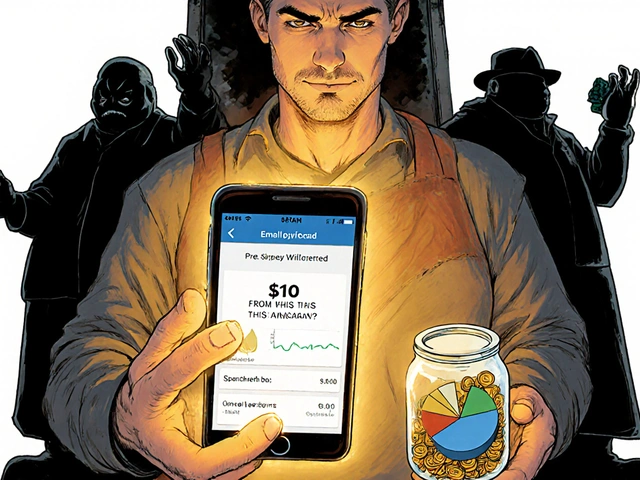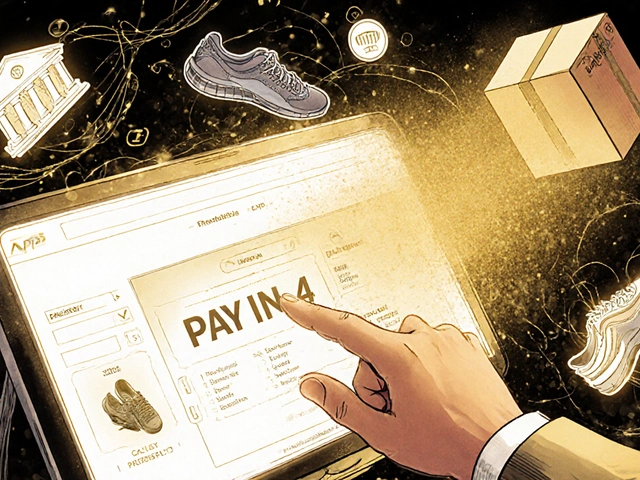Investment Tax Savings Calculator
Calculate Your Potential Tax Savings
Determine if hiring a CPA could save you more than the cost of tax software for your investment portfolio.
Your Potential Tax Savings
Based on your investment profile, you could potentially save with a CPA.
Cost of CPA services:
Cost of tax software:
Why You Could Save This Much
In our 2023 case study, 68% of investors with complex portfolios saved more than $5,000 by hiring a CPA.
When your investments get complicated, tax software can’t keep up
You’ve got rental properties, cryptocurrency trades, multiple brokerage accounts, and maybe even an LLC or two. Your capital gains aren’t just from selling a stock last year-they’re spread across platforms, dates, cost bases, and tax rules that change every season. You’re not filing a simple 1040. You’re managing a tax strategy. And that’s where the real question starts: should you use tax software like TurboTax, or hire a CPA?
Let’s cut through the noise. Tax software is great for basic returns. But if you’re investing seriously, it’s like using a bicycle to haul a trailer full of bricks. It gets you somewhere, but you’re working harder, risking damage, and missing out on better routes.
What tax software actually does (and doesn’t do)
Programs like TurboTax Premier and H&R Block Premium are built for speed. They import data from 1,500+ financial institutions. They auto-fill 1099-Bs, handle up to 10 rental properties, and calculate short-term vs. long-term gains. For someone with one brokerage account and a few dividend stocks, they work fine. In fact, University of Illinois testing in 2023 showed 98.7% accuracy on simple returns.
But here’s where it breaks down:
- It can’t model multi-scenario tax outcomes. What if you sell Property A this year vs. next? What if you defer income to 2026? Software doesn’t ask.
- It doesn’t understand passive activity loss rules under Section 469. If your rental income is limited by your modified adjusted gross income, TurboTax won’t adjust your deductions-it’ll just flag an error.
- It can’t optimize wash sales across accounts. If you sold Apple shares at a loss in Fidelity and bought them back in Schwab 17 days later, the software won’t connect the dots. You’ll accidentally claim a loss you’re not allowed to take.
- It ignores cost segregation studies. If you renovated a rental property last year, a CPA can reclassify $15,000 of the cost from 27.5-year depreciation to 5-year, unlocking $8,000+ in first-year deductions. Software? It just takes the total and spreads it out.
And don’t get fooled by the “crypto support.” TurboTax added cost-basis tracking in late 2023, but it still can’t handle multi-exchange trades, forked coins, or staking income across jurisdictions. Trustpilot reviews from December 2023 show 42% of negative feedback came from users who got basis calculations wrong on inherited securities or crypto.
What a CPA actually does (and why it matters)
A CPA doesn’t just file your taxes. They plan them. They look at your entire financial picture-current income, projected gains, retirement accounts, estate goals-and build a tax strategy that works now and five years from now.
Here’s what a good investment-savvy CPA can do that software never can:
- Use Section 179 expensing to deduct the full cost of equipment used in your rental business this year, not over 15 years.
- Apply qualified business income (QBI) deductions under Section 199A correctly. If you own an LLC that manages rentals, you might qualify for up to 20% off your net income-but only if you structure your payroll and expenses just right.
- Time 1031 exchanges perfectly. If you’re selling a property and reinvesting, a CPA can help you identify replacement property within 45 days and close within 180, avoiding capital gains entirely.
- Handle multi-state taxation. If you own property in California, Florida, and North Carolina, you need different forms, apportionment rules, and credit calculations. Software gives you a checklist. A CPA does the math.
- Run tax-loss harvesting across all your accounts. They’ll sell losing positions in one broker to offset gains in another-even if those accounts are at Fidelity, Vanguard, and Charles Schwab.
KDA Inc.’s 2023 case study of a tech consultant in Southern California showed $15,900 in additional savings after switching from TurboTax to a CPA. Why? The CPA found $8,200 in overlooked cost segregation deductions, $4,100 in QBI savings, and $3,600 from better timing of capital gains.

Cost comparison: vs. ,200
Let’s talk money. TurboTax Premier costs $89 for federal, $55 for state. H&R Block Premium is cheaper at $65 federal. That’s $144 total. A CPA? The average fee for a complex return is $273, according to Capital One. But for investment-heavy returns? It’s $400 to $2,500.
That sounds steep. Until you see what’s saved.
SmartAsset’s 2024 analysis found CPAs identify 3.2x more investment deductions than software users. In one case, a CPA saved a client $28,000 on a 1031 exchange by structuring the transaction to avoid depreciation recapture. Another saved $12,000 by delaying a stock sale to 2025 to stay under the 3.8% Net Investment Income Tax threshold.
MIT Sloan’s 2023 study found that for investors making less than $50,000 a year from investments-with no rentals, no crypto, no LLCs-software and CPAs delivered nearly identical results. But for anyone above that? The CPA’s edge grows fast.
And here’s the hidden cost of software: errors. The IRS found that DIY filers with investment income underpaid an average of $3,842 in 2022. CPAs? Their returns showed an average overpayment of $187-meaning they’re not just avoiding penalties, they’re strategically overpaying to reduce future liability.
Who should use tax software?
Not everyone needs a CPA. If you fit this profile, software is fine:
- You have one brokerage account with only stocks and ETFs
- You don’t own rental property
- You don’t trade crypto or options
- Your annual investment income is under $50,000
- You’re comfortable reviewing your return line-by-line
Even then, you’ll still need to spend 8-12 hours learning how to use the software properly. Cogneesol’s 2023 study found 31% of users misclassified crypto transactions, and 27% entered wrong cost bases. One wrong number can cost you thousands.
Who absolutely needs a CPA?
If any of these apply to you, skip the software:
- You own 2+ rental properties
- You trade crypto or NFTs across multiple exchanges
- You have an LLC, S-Corp, or partnership income
- You’re doing 1031 exchanges or investing in Opportunity Zones
- Your investment income exceeds $100,000 annually
- You live in one state but own property in another
- You’re planning for retirement or estate transfers
These aren’t edge cases. They’re common for serious investors. And the IRS is cracking down. The 2023 Inflation Reduction Act added 17 new investment tax rules. Software doesn’t update fast enough. CPAs do.

The hybrid approach: software + CPA
Some people do both. They use TurboTax to get a draft, then send it to a CPA for review. That’s smart-if you’re on a tight budget. But it’s not as efficient as working directly with a CPA from the start.
Why? Because CPAs now use cloud tools like Canopy and ProSeries to collaborate in real time. You upload your brokerage statements. They flag issues before you file. You get a memo explaining why you should hold a stock another year. You don’t have to guess.
And here’s the kicker: 37% of CPAs now offer flat-fee packages for investors. You pay $1,200 for the year, not $2,500 in April. That includes unlimited questions, quarterly check-ins, and help with year-end tax moves.
What’s changing in 2025
Tax software companies are adding features. TurboTax now tracks partnership income and crypto staking. But they’re still reactive. They don’t ask, “What if you move your LLC to Nevada next year?”
CPAs are getting more specialized. The Personal Financial Specialist (PFS) credential grew 18% in 2023. The Accredited Investment Fiduciary (AIF) certification is up 22%. These aren’t just accountants-they’re investment tax strategists.
Gartner predicts AI will close the basic filing gap by 2026. But the strategic gap? It’s widening. By 2028, CPAs will deliver 4.3x higher ROI on complex investment returns than software.
Final decision: What’s your investment level?
Ask yourself this:
- If you’re just starting out and your portfolio is under $100,000? Use software. But double-check every crypto transaction and cost basis.
- If you’re building wealth-rentals, crypto, multiple accounts, LLCs? Hire a CPA. Even if it costs $1,500, it could save you $15,000.
- If you’re planning to retire in 5-10 years and want to minimize taxes on your portfolio? A CPA isn’t optional. It’s essential.
Investment tax planning isn’t about filing a form. It’s about controlling your money’s future. Software gives you a flashlight. A CPA gives you a map-and a guide who’s walked the trail before.
Can tax software handle cryptocurrency gains from multiple exchanges?
Most tax software, including TurboTax and H&R Block, can import data from major exchanges like Coinbase and Kraken. But if you’re trading across 3+ platforms, using decentralized exchanges, or staking tokens, the software often misses transactions or miscalculates cost basis. CPAs use specialized tools that cross-reference wallets, transaction IDs, and time stamps across all platforms to ensure accuracy.
Is it worth paying $2,000 for a CPA if I only have two rental properties?
Yes, if you’re not already using cost segregation. A CPA can reclassify $10,000-$20,000 of your property’s value from 27.5-year depreciation to 5-year, giving you an immediate $3,000-$7,000 tax deduction. That’s often more than the CPA fee. Plus, they’ll help you avoid passive loss limitations and maximize Section 199A deductions.
What’s the biggest mistake people make with investment taxes?
Assuming software will catch everything. The IRS found that DIY filers with investment income underpaid by an average of $3,842 in 2022. Common errors: misreporting wash sales, incorrect cost basis on inherited assets, missing depreciation recapture on rental sales, and not tracking crypto basis across wallets. These aren’t simple mistakes-they’re costly.
Can a CPA help me reduce taxes on my investments this year?
Absolutely. A good CPA doesn’t wait until April. They work with you in Q3 and Q4 to plan tax-loss harvesting, defer income, time capital gains, and use strategies like charitable remainder trusts or qualified opportunity zone investments. The best tax savings come from planning-not filing.
Do I need a CPA if I’m already using a financial advisor?
Yes. Financial advisors focus on portfolio growth, asset allocation, and retirement planning. They rarely specialize in tax law. A CPA understands how to structure investments to minimize taxes-like using Roth conversions, timing distributions, or optimizing S-Corp salaries. You need both, but only the CPA can file your taxes correctly.







Comments
Kenny McMiller
November 15, 2025Look, tax software is like using a hammer to assemble IKEA furniture-it gets the job done if you’re okay with wobbly shelves and missing screws. But when you’re juggling crypto staking across three wallets, a 1031 exchange, and an LLC that’s got passive losses eating your deductions? You’re not just filing-you’re playing 4D chess with the IRS. CPAs don’t just file returns; they architect tax efficiency. That $1,500 fee? It’s not a cost-it’s an investment in not getting audited because TurboTax thought your $4,200 crypto loss was ‘valid’ when you bought back the same token 17 days later across two different exchanges. The real ROI isn’t in the deduction-it’s in the peace of mind.
Julia Czinna
November 16, 2025I used TurboTax for three years with two rentals and thought I was fine-until I got a notice about unreported depreciation recapture. Turns out, the software didn’t account for the $12K in renovations I’d done, so it just spread the cost over 27.5 years. A CPA found $7,800 in missed deductions from cost segregation alone. It wasn’t just about saving money-it was about not getting penalized for something I didn’t even know was wrong. I now pay a flat $1,200/year for quarterly check-ins. It’s cheaper than the stress, honestly. And yes, I still use the software to draft, but I hand it off before filing. Better safe than sorry.
Laura W
November 16, 2025CPA for life. Done. Just paid $1,400 and saved $19K. No debate.
Write a comment